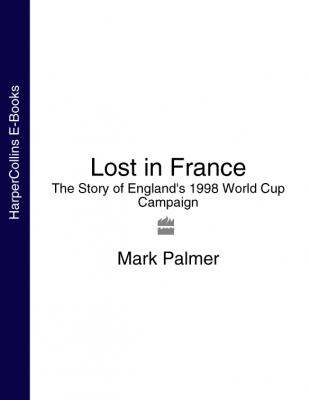Lost in France: The Story of England's 1998 World Cup Campaign. Mark Palmer
Читать онлайн.| Название | Lost in France: The Story of England's 1998 World Cup Campaign |
|---|---|
| Автор произведения | Mark Palmer |
| Жанр | Спорт, фитнес |
| Серия | |
| Издательство | Спорт, фитнес |
| Год выпуска | 0 |
| isbn | 9780007483136 |
Lost in France
The Story of England’s 1998 World Cup
MARK PALMER
Fourth Estate
an imprint of HarperCollins Publishers 1 London Bridge Street London SE1 9GF
First published in Great Britain in 1998
Copyright © 1998 Mark Palmer
The right of Mark Palmer to be identified as the author of this work has been asserted by him in accordance with the Copyright, Designs and Patents Act 1988.
A catalogue record for this book is available from the British Library.
All rights reserved under International and Pan-American Copyright Conventions. By payment of the required fees, you have been granted the non-exclusive, nontransferable right to access and read the text of this e-book on-screen. No part of this text may be reproduced, transmitted, down-loaded, decompiled, reverse engineered, or stored in or introduced into any information storage and retrieval system, in any form or by any means, whether electronic or mechanical, now known or hereinafter invented, without the express written permission of HarperCollins e-books.
Source ISBN: 9781857028553
Ebook Edition © FEBRUARY 2016 ISBN: 9780007483136
Version: 2016-01-11
For Henry
Contents
2. Who’s Got the Key to the Changing Room?
11. We’re in the Race Now, Aren’t We?
12. A Chance to Put Things Right
Paul Ince was wearing a pair of plastic slippers.
‘Let’s sit in the car,’ he said, pointing at a black Audi and pressing the remote control to unlock the doors. Liverpool’s training ground is sealed off on all four sides by concrete walls topped with barbed wire. Rows of semi-detached houses and blocks of flats line the neighbouring roads. It was cold and windy and beginning to rain. A fug built up inside the car so that you could barely see through the windows. The World Cup was four months away.
‘I’ve got to go off and see the house I’m having built,’ he said. The house was costing him almost £1 million, roughly his salary for a year.
‘At what point did you know you wanted to be a footballer?’
‘I was about eleven or twelve. I had nothing else to do. I was no good at school. Football was the only way out. I would have got myself in big trouble if I hadn’t been a footballer, so I concentrated extra hard on it, or at least a lot harder than other people.’
Ince seldom turned up for school in Ilford, and when he did it was more to join the fights than the lessons. He signed for West Ham as a YTS trainee at the age of fourteen.
‘This World Cup is the pinnacle of my career. Looking back, I know I have achieved a lot. I have played for Manchester United and I have experienced football in Italy, but this is the biggest you can get. I just wish it had come earlier. I am very aware that for me and some of the others this is our first and last chance. I get pumped up for England matches without having to think about it. Like the Italy game in Rome. It was incredible. I felt the whole nation behind us. I’m not saying I don’t get fired up for Liverpool, but then it’s just the Liverpool supporters hoping you do well, not the whole country. That’s the difference. You should have seen David Seaman in Rome. He is usually unflappable. He never shows any nerves and then six minutes before the game he said to me: “I feel sick.” That’s how much it means.’
I asked him about penalties. People think he froze in Euro 96 against the Germans, that he couldn’t face it, that he made himself scarce when the short straws were being handed out.
‘It wasn’t like that. We were all standing around in groups and before I knew it they had sorted out who the penalty-takers would be. I asked, what number am I? And someone told me I was number six or seven. I really didn’t have a say in it. It wasn’t that I didn’t want to take one.’
‘If it came to it in France would you want to take one?’
‘If I have to take one …’ He looked down at the steering-wheel and then at me and then his eyes began dancing about the dashboard. ‘If it means going to take a penalty … then I will have to take one.’
‘But you would rather not.’
‘If it happens it happens. You have to have guts to take a penalty. You need a lot of bottle.’
‘Do you think about it much?’
‘No.’
‘Why?’
‘Because I would feel so awful if I missed.’
